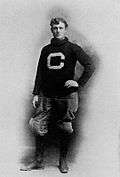Daniel A. Reed
| Daniel A. Reed | |
|---|---|
 | |
| Member of the U.S. House of Representatives from New York's 43rd district | |
|
In office January 3, 1953 – February 19, 1959 | |
| Preceded by | Edmund P. Radwan |
| Succeeded by | Charles E. Goodell |
|
In office March 4, 1919 – January 3, 1945 | |
| Preceded by | Charles M. Hamilton |
| Succeeded by | Edward J. Elsaesser |
| Member of the U.S. House of Representatives from New York's 45th district | |
|
In office January 3, 1945 – January 3, 1953 | |
| Preceded by | None (district created) |
| Succeeded by | None (district eliminated) |
| Personal details | |
| Born |
Daniel Alden Reed September 15, 1875 Sheridan, New York, U.S. |
| Died |
February 19, 1959 (aged 83) Washington, D.C., U.S. |
| Political party | Republican |
| Alma mater | Cornell University (LL.B.) |
Daniel Alden Reed (September 15, 1875 – February 19, 1959) was an American football player, coach, and U.S. Representative from the state of New York. Reed was attorney for the excise department of New York from 1903 to 1909. He served in the House of Representatives as a Republican from 1919 until his death in Washington, D.C., on February 19, 1959.
Professional career

Reed was born in Sheridan, New York on September 15, 1875. He attended the public schools of Sheridan and Silver Creek, New York, and graduated from Cornell University in 1898, where he was a member of the Delta Chi Fraternity and the Quill and Dagger society. Reed studied law, was admitted to the bar in 1900, and practiced first in Silver Creek, and later in Dunkirk, New York. Reed was also a board of directors member for the Dunkirk Trust Company, and became a popular speech maker on business and civic topics.
He was an attorney for the New York State Excise Department from 1903 to 1909. During World War I he was one of the commissioners sent to France by the federal government to study the ongoing food shortage in preparation for a U.S. lecture tour on the importance of food conservation.
Coaching career
After playing football at Cornell University, Reed coached at the University of Cincinnati, Pennsylvania State University, and his alma mater. From 1899 to 1900 he coached at Cincinnati, and guided the Bearcats to an 8–6–1 record. He coached at Penn State in 1903, compiling a 5–3 record. From 1910 to 1911, he was the head coach at Cornell, where he led that team to a 12–5–1 record. His career record is 25-14-2.
Head coaching record
| Year | Team | Overall | ||||||
|---|---|---|---|---|---|---|---|---|
| Cincinnati (1899–1900) | ||||||||
| 1899 | Cincinnati | 5–2 | ||||||
| 1900 | Cincinnati | 3–4–1 | ||||||
| Cincinnati: | 8–6–1 | |||||||
| Penn State Nittany Lions (1903) | ||||||||
| 1903 | Penn State | 5–3 | ||||||
| Penn State: | 5–3 | |||||||
| Cornell Big Red (1910–1911) | ||||||||
| 1910 | Cornell | 5–2–1 | ||||||
| 1911 | Cornell | 7–3 | ||||||
| Cornell: | 12–5–1 | |||||||
| Total: | 25–14–2 | |||||||
Congressional career
In 1918 Reed was elected to Congress as a Republican. He was reelected 20 times, and served from March 4, 1919 until his death. During his time in the U.S. House Reed was chairman of the Committee on Industrial Arts and Expositions (Sixty-eighth Congress); the Committee on Education (Sixty-ninth through Seventy-first Congresses); the Committee on Ways and Means (Eighty-third Congress); and the Joint Committee on Internal Revenue Taxation (Eighty-third Congress).
Reed was a delegate to the Interparliamentary Union meeting in Rome, Italy in 1948. He later served as a delegate at meetings in Sweden, Switzerland, and France.
During his years in Congress, Reed was one of the most conservative members of the New York delegation, frequently scoring zeros from Americans for Democratic Action, and was one of the few isolationists remaining in the New York delegation after World War II.
Reed was also one of the few Republicans to consistently oppose banning the poll tax through legislative means, although he did vote in favor of anti-lynching legislation and the Civil Rights Act of 1957.
Death and burial
Reed died in Washington, D.C. on February 19, 1959. He was buried at Sheridan Cemetery in Sheridan, New York.
Legacy
The library at the State University of Fredonia was named for him.
See also
References
External links
- United States Congress. "Daniel Alden Reed (id: R000113)". Biographical Directory of the United States Congress.
- Daniel Alden Reed at Find a Grave
- Daniel Alden Reed at the College Football Data Warehouse
| United States House of Representatives | ||
|---|---|---|
| Preceded by Charles Mann Hamilton |
Member of the U.S. House of Representatives from New York's 43rd congressional district 1919–1945 |
Succeeded by Edward J. Elsaesser |
| Preceded by District 45 created in 1945 |
Member of the U.S. House of Representatives from New York's 45th congressional district 1945–1953 |
Succeeded by District 45 eliminated after the 1950 Census |
| Preceded by Edmund P. Radwan |
Member of the U.S. House of Representatives from New York's 43rd congressional district 1953–1959 |
Succeeded by Charles E. Goodell |
